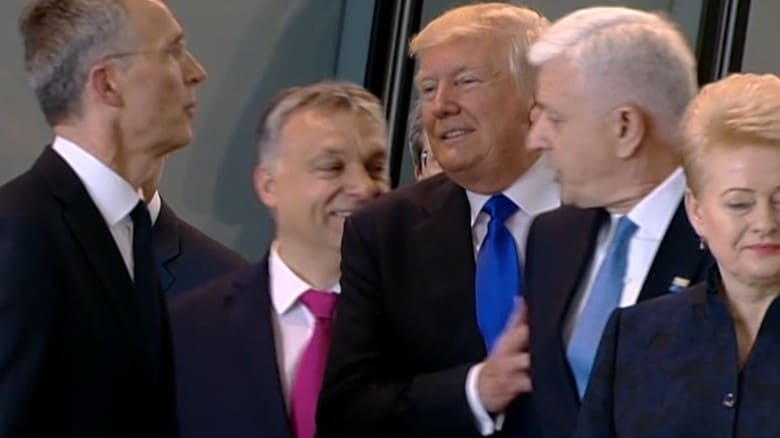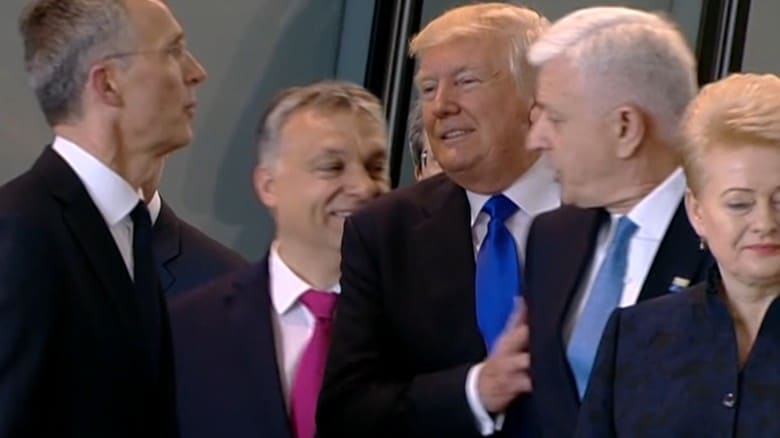
President Trump’s ignorant, oafish and crude foreign policy style rivets our attention, arouses our indignation. But the drama of the diplomatic mayhem he wreaks while traveling abroad also distracts from recognizing more serious underlying problems of US policy— deep negative trends that predate Trump.
Focusing on Trump’s latest crude pronouncements encourages the soothing belief that these current dilemmas are all his doing. In other words, if we didn’t have Trump, the US would be back in the comfortable saddle as world’s acknowledged, respected, indispensable leader. The sad fact is, we can vent our anger as we like, but the old days just aren’t coming back. It would indeed be a huge relief to be able to attribute our current foreign policy mess to the incompetence of one individual.
President Obama posed the reverse problem: his intelligent, gracious, sophisticated and knowledgeable style lulled us into believing that all should be well on the foreign policy front with the right guy in charge. But in reality the gratifying nature of Obama’s style too, concealed on numerous fronts the critical issues he failed to address or incorrectly addressed.
Trump’s outrages are too numerous to deal with in one piece; here I’d like to focus specifically on the recent brouhaha over NATO and questions about Trump’s alleged destruction of America’s “reliablility” as a partner in Europe. Let me suggest a few key, perhaps contrarian, propositions of my own, drawn from my perspective as a former “sovietologist,” and student of Russian culture and affairs. I write this too, with overwhelming concern for the unprecedented binge of American hysteria—there is no other word for it—over Putin and Russia’s place in the world. The words of Soviet expert on American foreign policy, Georgi Arbatov, to an American diplomat upon the collapse of the USSR, come back to haunt: “We are going to do a terrible thing to you, we are going to deprive you of your enemy.” Indeed the US has been thrashing around ever since.
So, Trump has bluntly called upon the EU to shoulder a greater share of the burden in NATO’s upkeep. He is not wrong. Indeed, the EU very much should take far more responsibility on issues of global security—but not so much financially, but by determining, on its own for a change, what it perceives to be its own security problems and how to manage them.
In today’s post-Soviet world the reality is that most of European political culture no longer instinctively shares the American perspective on global affairs. The US is increasingly driven by a security- and military-dominated approach to handling international crises. This trend towards the militarization of American foreign policy has been growing by leaps and bounds, particularly since 9/11. America excels at “threat perception,” it’s what keeps US think tanks and arms industries in business.
Let’s take the proposition one step farther. Despite the many shrill voices in Washington, Russia simply cannot be taken as “the greatest threat to American security and welfare.” Non-stop American wars and their consequences are the greatest threat. Washington’s choice of primarily military means to handle contemporary radical trends in Muslim societies has not only failed to solve them, but has demonstrably exacerbated them. We are fighting on more fronts against radicalized Muslims than ever before. Yet these multiple simultaneous American wars bleed the budget, usurp funding for social infrastructure, maintain a culture of fear, and stimulate the growth of the security state. And yes, it’s gotten worse under Trump.
Just look at the costs. The US suffers from the most massive gap between rich and poor of any country in the developed world. This gap not only produces economic hardship, but corrodes social unity, stimulates anger, bitterness, divisiveness and feeds the paranoid attitudes that are directly responsible for electing Trump in the first place. There is no sign that the insatiable American embrace of non-stop war is slackening—on the contrary. New crises emerge everywhere; there is virtually no area of the world left that does not at some point require “urgent American leadership” to preserve American “vital interests.” But this perspective of what constitutes the “vital interests” of the West is no longer widely shared in Europe. And it is simply extraordinary that there is zero discussion anywhere in US election campaigns or in the MSM to challenge the military budget.
Nor for most of Europe is Russia anywhere remotely the greatest challenge to their security and welfare. Massive refugee flows, immigration and their resulting domestic tensions, costs of refugee absorption, and even Muslim extremism are the true challenges. Can we really believe that American military intervention in the Muslim world over the past few decades—resulting in the killing of at least two million Muslims—has not created profound ground for the ongoing backlash?
Beyond security issues, the EU also urgently faces the need to reform its economic bureaucracy to more fairly and equitably address the economic and social problems of Europe. Here the EU places the highest priority on preserving domestic tranquility, even while the US does not. Starving Europe’s social and economic budgets to support greater military expenditures is not productive. Europe knows that. Global security is better served by preserving Europe’s own economic and social order than by spending money on arming itself up at US behest for some putative Russian military threat.
Let’s consider the Russian military threat. The US military budget alone is greater than the combined budgets of the next eight military budgets combined (including Russia and China.) Russia is a poor country with a modest military budget. Numbers aren’t everything of course, and US think tanks work overtime forging creative scenarios about how Russia can still actually defeat the US in a European conflict—justifying ever greater US military budgets.
But what do we think Russia is actually going to do? Invade Europe? In reality Russia does not threaten the EU in any serious respect, as most balanced European observers will admit. It’s interesting here to look at how many times Russia has actually invaded the West. Looks like twice in two centuries—and both times in direct response to European invasions of the Russian heartland.
The first occurred under the Napoleonic Wars in the early 1800s. Napoleon, as part of his campaigns to conquer most of Europe, foolishly invaded Russia in 1812. As the French were unable to get the strategically retreating Russian army to seriously engage militarily, even at the gates of Moscow, the Russians, aided by “General Winter” as Tolstoy puts it, chased Napoleon all the way back into Central Europe. At that point the Russian army joined the grand European coalition against Napoleon in Europe. Indeed, Napoleon’s disaster in Russia was a turning point for the European war against Napoleon. The Russian army soon thereafter went back home.
The second Russian invasion of the West was in the late days of World War II. Here, as we know, Hitler fatally decided to invade Russia, where he spread destruction, starvation and death. The Soviet Union, at the staggering costs of upwards of 25 million Russians dead in the long war, eventually drove Hitler back into Germany. Russia was more responsible than any other country for the devastation of Hitler’s Wehrmacht. And Western allies gave maximum support to the Red Army’s offensive against Hitler. Trouble was, after driving the Germans back to Germany, Soviet forces didn’t go back home. Stalin occupied all of Eastern Europe (and Karelia) subjecting it to harsh Russian communist control and ideology for over 40 years.
These events represent the two extraordinary circumstances of Russian invasion of the West. These conditions are not readily replicated.
For sure, Russia has played its part over the past two centuries in numerous small military engagements around its periphery as part of the endless European Great Power struggles for spheres of influence. But the same has been true of every single major western power fighting battles in its periphery over the years, including the US, Britain, France, Germany, Italy, Sweden, Austria, Turkey and others. It is never comfortable for a small state to live next to a great power anywhere.
Europe, by dint of proximity and experience knows and understands Russia well. Germany above all is the one major power that will always bear the primary responsibility for handling the Russian account in Europe; Russia and Germany after all are the two major powers of Central and Eastern Europe. Here Germany remains knowledgeable and sober-minded. Since the fall of the ideological empire of the Soviet Union large segments of German public opinion are uncomfortable with American policies designed to push NATO up to the very gates of Russia. Such acts are viewed as highly provocative intrusion into an area of traditional Russian sphere of influence. Indeed, Germany’s last foreign minister Frank Walter Steinmeier recently spoke out against what he saw as “provocative” NATO exercises near the Russian border in the Baltics.
Yet Washington seems hard-wired to deprive Russia of its sphere of influence anywhere it can, all the while finding it unacceptable that any power should challenge, anywhere, the American sphere of interest. Indeed, the US has been obsessed with Russia for over two centuries, especially on the religious, cultural and ideological level. (See the NYT book review of a deeply insightful book “The American Mission and the “Evil Empire” by David S. Foglesong.
Thus Washington persists in its own strategic view in which there can be no win-win with Russia. (Trump actually spoke of trying to improve relations, only to unleash the full wrath of the US security establishment upon his head. Trump’s own unorthodox approach has not helped.)
Maintenance of overwhelming US power and strategic global reach —“full- spectrum dominance” in Pentagonese—is the American strategic goal. But that is not the European goal or the European perception of a future world order. Europe is far more readily willing to deal seriously, for example with Cuba, Iran, Palestine, China, and Russia, among others. And Europe has been severely damaged by US-sponsored regime change wars in the Middle East—witness Muslim terrorism and refugees. Europe is also well aware of how the balance of world influence has gradually been shifting against the US (although certainly not in military terms). Europeans do not applaud this change as such, but understand that the rise of other world powers represents future geopolitical reality.
Thus Europe, from its own perspective, is ironically in a much healthier position if it now does assume primary responsibility for its own security in managing the European political, economic, and social relationship with Russia. Once the Cold War was over NATO essentially had become Washington’s chief instrument for exerting dominant control over European security policy. That situation increasingly tallies less with European strategic perceptions.
Trump’s crudeness thus finally provided the tipping point for new and long overdue EU thinking about the European-Russian relationship under the new world realities. NATO officials of course will never see it that way. But this European reality will not likely be reversed by any US president. And Europe is acutely aware that Putin’s policies in Europe will directly reflect US policy steps against him. Russia is Russia; neocon fantasies about “solving the problem” by getting rid of Putin is bereft of any geostrategic or historical understanding of reality. In a similar vein Europe does not wish to buy into a confrontational position with China in Asia.
This is not to say that there will not be occasions for some kind of joint western military presence to possibly bolster unstable situations in different parts of the world down the road. But if Europe is to be enlisted into military operations elsewhere in the world, Europe will have to decide independently where and how its interests dictate.
America’s genius has always lain in its soft power, a commodity that sadly seems in increasingly short supply.
Reprinted with permission from GrahamEFuller.com.

